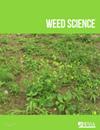Goosegrass (Eleusine indica) Resistant to Multiple Herbicide Modes of Action in Brazil
IF 2.1
2区 农林科学
Q2 AGRONOMY
引用次数: 0
Abstract
Abstract This study was developed based on a goosegrass [Eleusine indica (L.) Gaertn.] population from Primavera do Leste, MT, Brazil, with resistance to multiple herbicide modes of action (5-enol-pyruvylshikimate-3-phosphate synthase [EPSPS] inhibition: glyphosate; acetyl-coenzyme A carboxylase [ACCase] inhibition: aryloxyphenoxypropionate chemical group). The objective was to identify possible mechanisms of resistance associated or not with herbicide sites of action. Several experiments and analyses were carried out with the contribution of different laboratories and institutions. The results obtained allowed us to conclude that: (1) the Asp-2078-Gly mutation conferred resistance to ACCase inhibitors, without overexpression of ACCase or changes in herbicide absorption and translocation; (2) overexpression of EPSPS, Thr-102 and Pro-106 mutations, and changes in absorption and translocation are not involved in E. indica resistance to glyphosate; (3) the metabolism of glyphosate in resistant E. indica plants requires further studies to elucidate the final destination of this herbicide in these plants. The mechanism of resistance of E. indica biotypes to ACCase-inhibiting herbicides was elucidated: it involves a change in the action site. However, the mechanism of resistance to EPSPS inhibitors was not conclusive, indicating that some hypotheses, mainly those regarding the metabolism of glyphosate in resistant plants, require further testing.巴西鹅草(Eleusine indica)对多种除草剂的抗性
摘要本研究基于来自巴西MT的Primavera do East的鹅草[Eleusine indica(L.)Gaertn.]种群,该种群对多种除草剂作用模式具有抗性(5-烯醇-丙酮酸莽草酸-3-磷酸合酶[EPSP]抑制:草甘膦;乙酰辅酶a羧化酶[ACSe]抑制:芳氧基苯氧丙酸酯化学基团)。目的是确定与除草剂作用位点相关或不相关的可能抗性机制。在不同实验室和机构的帮助下进行了一些实验和分析。所获得的结果使我们得出结论:(1)Asp-2078-Gly突变赋予了对ACCase抑制剂的抗性,而没有ACCase的过表达或除草剂吸收和转运的变化;(2) EPSPS、Thr-102和Pro-106突变的过表达以及吸收和易位的变化与籼稻对草甘膦的抗性无关;(3) 草甘膦在抗性籼稻植物中的代谢需要进一步的研究来阐明这种除草剂在这些植物中的最终目的地。阐明了籼稻生物型对ACC酶抑制剂的抗性机制:它涉及作用位点的变化。然而,对EPSPS抑制剂的抗性机制并不是决定性的,这表明一些假设,主要是关于草甘膦在抗性植物中代谢的假设,需要进一步测试。
本文章由计算机程序翻译,如有差异,请以英文原文为准。
求助全文
约1分钟内获得全文
求助全文
来源期刊

Weed Science
农林科学-农艺学
CiteScore
4.60
自引率
12.00%
发文量
64
审稿时长
12-24 weeks
期刊介绍:
Weed Science publishes original research and scholarship in the form of peer-reviewed articles focused on fundamental research directly related to all aspects of weed science in agricultural systems. Topics for Weed Science include:
- the biology and ecology of weeds in agricultural, forestry, aquatic, turf, recreational, rights-of-way and other settings, genetics of weeds
- herbicide resistance, chemistry, biochemistry, physiology and molecular action of herbicides and plant growth regulators used to manage undesirable vegetation
- ecology of cropping and other agricultural systems as they relate to weed management
- biological and ecological aspects of weed control tools including biological agents, and herbicide resistant crops
- effect of weed management on soil, air and water.
 求助内容:
求助内容: 应助结果提醒方式:
应助结果提醒方式:


